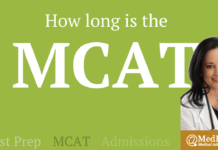MD-PhD Programs: How to get in (2021-2022)
Are you passionate about medicine and research? If so, you should consider pursuing an MD-PhD program. These rigorous programs prepare students who excel in these areas to become physician scientists.
Only about 600 students enter MD-PhD programs each year, according to the Association of American Medical Colleges (AAMC) — a far smaller number than tens of thousands who matriculate at medical schools. But that doesn’t mean these programs are any less selective or prestigious than medical school.
Are you considering applying to an MD-Phd program? Here’s what you should know and how to prepare.
What are MD-PhD programs?
MD-PhD programs give students a grounding in both clinical training in medicine and research. After successfully completing your program, you will earn both degrees.
Like many dual-degree programs, this is an extremely rigorous and challenging route to take. You will need to complete the requirements associated with both degrees, including writing a dissertation and treating patients.
How Long Do These Programs Take to Complete?
Most MD-PhD programs take around 7-8 years to complete, although some students do it in a longer or shorter period of time. After completing the program, you will need to train and prepare for work in your field, which takes another several years — the length of time varies based on your specialty.
What is the Typical Structure of an MD-PhD Program?
While there can be some slight variations in the exact structure of an MD-PhD program, the basic structure is listed below:
- Years 1 and 2: Take basic science classes with your entering medical school class
- Years 3, 4, 5, and 6: Complete PhD research
- Years 7 and 8: Complete years three and four of medical school which are your clinical rotations
What Are Medical Scientist Training Programs?
Funded by the National Institute of Health (NIH), Medical Scientist Training Programs (MSTP) describe MD-PhD programs that come with special benefits, including full tuition coverage and stipends for housing and living. These programs are highly competitive but extremely rewarding, and students enjoy additional career-development opportunities like conferences, mentorship, and additional resources.
How Competitive are MD-PhD versus MD-only Programs?
Getting into MD-PhD programs is more difficult than getting into MD-only programs. Why? With MD-PhD programs, you need to get “accepted” by both the MD portion of the program and the PhD portion of the program. So, not only do you have to meet criteria for both, but the process is often longer and more drawn out. Everyone once in a while a student approaches us thinking applying for MD-PhD will help improve chances of admission and this is the opposite of the truth!
Let’s review the data:
- MCAT and GPA: In 2020-2021, the average GPA for MD-PhD matriculants was 3.8 and the average MCAT was 516.2. Compare this to the average GPA and MCAT of medical school matriculants: 3.73 and 511.5.
- Acceptance Rate: There were a total of 701 MD-PhD matriculants of 1855 applicants for an acceptance rate of 37.7%. Compare this to an MD-only acceptance rate of 41.9%
Are There Alternatives to MD-PhD Programs?
The primary alternative to an MD-PhD program is to take a gap year or two during medical school to pursue research in the specialty you hope to pursue. In fact, for more competitive residencies and specialties, this is becoming increasingly more common as having valuable research experience is important for the most competitive specialties in medicine. Keep in mind that one or two years of research will not earn you an additional degree like a formal MD-PhD will so choose the option that is best aligned with your future goals.
Tips for Applying
Understand the Differences in the Application Process.
MD-PhD applicants follow a similar process as MD applicants do. They generally submit applications through the American Medical College Application Service (AMCAS). However, students must declare their intention to apply as MD-PhD candidates and complete two additional essays as part of the application. Make sure you complete the essays quickly but thoughtfully.
Bolster Your Academic Credentials.
In the 2020–2021, there were 1,825 MD-PhD applicants to MD-PhD programs, and 701 students ended up matriculating. While this admissions rate is on par with that of MD programs, arguably, MD-PhD programs are more self-selective, meaning only students who are truly passionate about this career path tend to apply, and that number is significantly smaller than those who aspire to be physicians. Moreover, there are far fewer of these programs available.
That means you will need to have a high GPA and MCAT score. You may need to retake the MCAT and bolster your GPA by adding additional courses if they aren’t quite there.
Have a Strong Resume with Impressive Research Experience.
Because these programs emphasize research, you will need to demonstrate plenty of research experience when you apply. Seek out opportunities to work in labs, with professors, as an intern, and so on. Aim to be listed as an author on several publications — this will make you that much more competitive candidate.
Not having stellar research experience is one of the primary reasons we advise students not to apply ot MD-PhD programs and instead to apply only to MD programs.
Consider Applying to MD-only Programs Simultaneously.
You’ll improve your chances of being admitted to at least one program if you also apply for medical schools simultaneously. You can even be considered as an MD-only candidate at schools where you’re not admitted as an MD-PhD program. Just mark this on your application.
MD-PhD AMCAS Essay Prompts and Character Limits:
MD-PhD Essay
If you are applying to an MD-PhD program(s), you are required to provide two additional essays, the MD-PhD Essay and the Significant Research Experience Essay. Use the MD-PhD Essay to state your reasons for pursuing the combined MD-PhD degree. Your response will be forwarded only to your designated MD-PhD program(s). This essay is limited to 3,000 characters.
Below this essay, you’ll be asked to enter your total hours of research experience.
Significant Research Experience Essay
In addition to the MD-PhD Essay, you are required to write an essay that describes your significant research experiences. In this essay, please specify your research supervisor’s name and affiliation, the duration of the experience, the nature of the problem studied, and your contributions to the research effort. The essay is limited to 10,000 characters.
If your research resulted in a publication on which you were an author, please enter the full citation in the Work/Activities section of your application
What to Focus on in Your Essays
Keep in mind that your two additional MD-PhD essays will be considered together with your AMCAS medical school personal statement and work and activities. These two additional essays should be straightforward and direct.
This is not the place to get creative. Instead, express why you want to pursue an MD-PhD: What are your research interests and how and why would an MD-PhD allow you to reach your goals? Why do you want to merge a career in clinical medicine and research? What are your future goals?
We suggest asking a principal investigator or mentor to review your significant research experience essay to make sure it includes the necessary details about your research.
Where Do Graduates Work?
Physician scientists have many career paths available to them. After completing their residencies, they can go onto work at teaching hospitals, medical schools, independent research labs, government agencies, pharmaceutical companies, and more
Remember, too, that graduates can rely on one degree over another or apply them both to their work. Ultimately, there are numerous options to explore.
List of MD-PhD Programs in the US (*NIH-Funded Programs)
| Institution | Location |
| Albany Medical College | Albany, NY |
| Albert Einstein College of Medicine of Yeshiva University* | Bronx, NY |
| Baylor College of Medicine* | Houston, TX |
| Boston University School of Medicine | Boston, MA |
| Brody School of Medicine at East Carolina University | Greenville, NC |
| Brown University School of Medicine | Providence, RI |
| Case Western Reserve University School of Medicine* | Cleveland, OH |
| Columbia University College of Physicians and Surgeons* | New York, NY |
| Creighton University School of Medicine | Omaha, NE |
| Drexel University College of Medicine | Philadelphia, PA |
| Duke University School of Medicine* | Durham, NC |
| East Tennessee State University James H. Quillen College of Medicine | Johnson City, TN |
| Eastern Virginia Medical School | Norfolk, VA |
| Emory University School of Medicine* | Atlanta, GA |
| Geisel School of Medicine at Dartmouth | Hanover, NH |
| Georgetown University School of Medicine | Washington, DC |
| Harvard Medical School* | Boston, MA |
| Hofstra North Shore – LIJ School of Medicine | Hempstead, NY |
| Howard University College of Medicine | Washington, DC |
| Indiana University School of Medicine* | Indianapolis, IN |
| Johns Hopkins University School of Medicine* | Baltimore, MD |
| Keck School of Medicine of the University of Southern California | Los Angeles, CA |
| Loma Linda University School of Medicine | Loma Linda, CA |
| Louisiana State University, New Orleans School of Medicine | New Orleans, LA |
| Louisiana State University, Shreveport School of Medicine | Shreveport, LA |
| Loyola University of Chicago – Stritch School of Medicine | Maywood, IL |
| Marshall University School of Medicine | Huntington, WV |
| Mayo Medical School* | Rochester, MN |
| McGovern Medical School at UTHealth/MD Anderson Cancer Center/University of Puerto Rico Tri-Institutional Program | Houston, TX |
| Medical College of Georgia | Augusta, GA |
| Medical College of Georgia at Augusta University | Augusta, GA |
| Medical College of Wisconsin* | Milwaukee, WI |
| Medical University of South Carolina | Charleston, SC |
| Meharry Medical College School of Medicine | Nashville, TN |
| Michigan State University College of Medicine | East Lansing, MI |
| Morehouse School of Medicine | Atlanta, GA |
| Mount Sinai School of Medicine – Icahn* | New York, NY |
| National Institutes of Health Intramural MD-PhD Partnership | Bethesda, MD |
| New York Medical College | Valhalla, NY |
| New York University School of Medicine* | New York, NY |
| Northeastern Ohio College of Medicine | Rootstown, OH |
| Northwestern University Medical School* | Chicago, IL |
| Ohio State University College of Medicine* | Columus, OH |
| Oregon Health Sciences University School of Medicine | Portland, OR |
| Penn State University College of Medicine* | Hershey, PA |
| Rosalind Franklin University of Medicine and Science – Chicago Medical School | North Chicago, IL |
| Saint Louis University School of Medicine | St. Louis, MO |
| Sidney Kimmel Medical College at Thomas Jefferson University | Philadelphia, PA |
| Stanford University School of Medicine* | Stanford, CA |
| SUNY at Buffalo School of Medicine | Buffalo, NY |
| SUNY Downstate Medical Center College of Medicine | Brooklyn, NY |
| SUNY at Stony Brook Health Sciences Center* | Stony Brook, NY |
| SUNY Upstate Medical University | Syracuse, NY |
| Temple University School of Medicine | Philadelphia, PA |
| Texas A&M University Health Sciences Center College of Medicine College | Station, TX |
| Texas Tech University School of Medicine | Lubbock, TX |
| Tufts University School of Medicine* | Boston, MA |
| Tulane University School of Medicine | New Orleans, LA |
| Uniformed Services University of the Health Sciences | Bethesda, MD |
| University of Alabama School of Medicine* | Birmingham, AL |
| University of South Alabama College of Medicine | Mobile, AL |
| University of Arizona College of Medicine | Tucson, AZ |
| University of Arizona College of Medicine – Phoenix | Phoenix, AZ |
| University of Arkansas College of Medicine | Little Rock, AR |
| University of California, Davis School of Medicine | Davis, CA |
| University of California, Irvine School of Medicine* | Irvine, CA |
| University of California, Los Angeles School of Medicine* | Los Angeles, CA |
| University of California, San Diego School of Medicine* | La Jolla, CA |
| University of California, San Francisco School of Medicine* | San Francisco, CA |
| University of Chicago Pritzker School of Medicine* | Chicago, IL |
| University of Cincinnati College of Medicine* | Cincinnati, OH |
| University of Colorado Health Sciences Center* | Denver, CO |
| University of Connecticut School of Medicine | Farmington, CT |
| University of Florida College of Medicine | Gainesville, FL |
| University of Illinois at Chicago College of Medicine* | Chicago, IL |
| University of Illinois at Urbana-Champaign College of Medicine | Urbana, IL |
| University of Iowa College of Medicine* | Iowa, IA |
| University of Kansas School of Medicine | Kansas City, KS |
| University of Kentucky College of Medicine | Lexington, KY |
| University of Louisville School of Medicine | Louisville, KY |
| University of Maryland at Baltimore School of Medicine* | Baltimore, MD |
| University of Massachusetts Medical School* | Worcester, MA |
| University of Medicine & Dentistry of New Jersey – New Jersey Medical School | Newark, NJ |
| University of Medicine & Dentistry of New Jersey – Robert Wood Johnson Medical School | Piscataway, NJ |
| University of Miami Miller School of Medicine* | Miami, FL |
| University of Michigan Medical School* | Ann Arbor, MI |
| University of Minnesota Medical School* | Minneapolis, MN |
| University of Mississippi School of Medicine | Jackson, MS |
| University of Missouri – Columbia School of Medicine | Columbia, MO |
| University of Missouri – Kansas City School of Medicine | Kansas City, MO |
| University of Nebraska College of Medicine | Omaha, NE |
| University of Nevada School of Medicine | Reno, NV |
| University of New Mexico School of Medicine | Albuquerque, NM |
| University of North Carolina at Chapel Hill School of Medicine* | Chapel Hill, NC |
| University of North Dakota School of Medicine | Grand Forks, ND |
| University of Oklahoma Health Sciences Center | Oklahoma City, OK |
| University of Pennsylvania School of Medicine* | Philadelphia, PA |
| University of Pittsburgh School of Medicine* | Pittsburgh, PA |
| University of Rochester School of Medicine* | Rochester, NY |
| University of South Carolina School of Medicine* | Columbia, SC |
| University of South Dakota School of Medicine | Vermillion, SD |
| University of South Florida College of Medicine | Tampa, FL |
| University of Tennessee, Memphis College of Medicine | Memphis, TN |
| University of Texas at Austin | Austin, TX |
| University of Texas Health San Antonio, Long School of Medicine* | San Antonio, TX |
| University of Texas Medical Branch at Galveston | Galveston, TX |
| University of Texas, Southwestern Med Center – Dallas* | Dallas, TX |
| University of Toledo College of Medicine | Toledo, OH |
| University of Utah School of Medicine | Salt Lake City, UT |
| University of Vermont College of Medicine | Burlington, VT |
| University of Virginia School of Medicine* | Charlottesville, VA |
| University of Washington School of Medicine* | Seattle, WA |
| University of Wisconsin Medical School* | Madison, WI |
| Vanderbilt University School of Medicine* | Nashville, TN |
| Virginia Commonwealth University School of Medicine | Richmond, VA |
| Wake Forest School of Medicine | Winston-Salem, NC |
| Washington University School of Medicine* | St. Louis, MO |
| Wayne State University School of Medicine | Detroit, MI |
| Weill Cornell/Rockefeller/Sloan-Kettering Tri-Institutional MD/PhD Program* | New York, NY |
| West Virginia University School of Medicine | Morgantown, WV |
| Wright State University School of Medicine | Dayton, OH |
| Yale University School of Medicine* | New Haven, CT |








